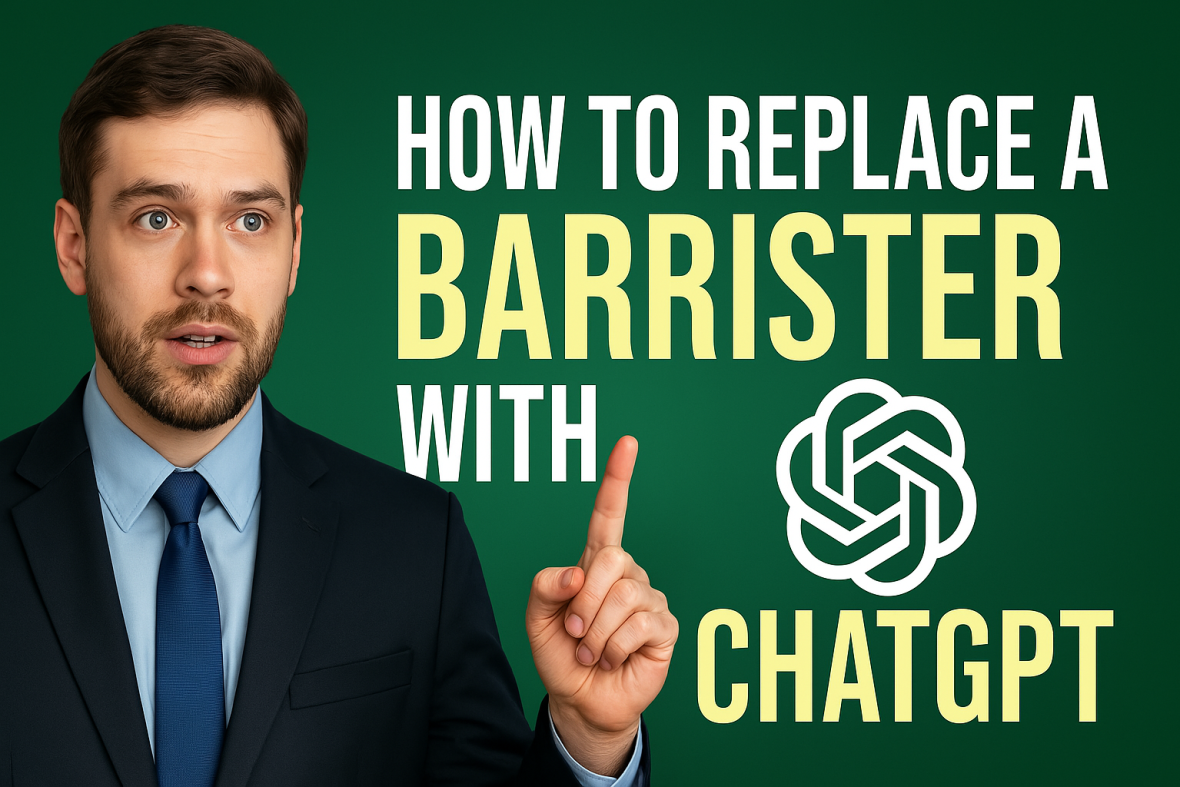Here’s a highly detailed and elaborated version of how to replace the need for a barrister using ChatGPT, how to set up your own virtual legal department, and how to sue someone—all using AI. I’ll also include official ChatGPT access links at the end.
How to Replace a Barrister with ChatGPT, Create a Legal Department, and Sue Someone Using AI
Artificial Intelligence is transforming the legal field. While it’s still legally required in most countries to use a licensed lawyer or barrister to represent you in court, you can now replicate much of what a legal team or barrister does using ChatGPT—right from your phone or laptop.
This guide walks you through:
- How to use ChatGPT to act as your personal legal assistant
- How to build a virtual legal department
- How to prepare and initiate a lawsuit without hiring a lawyer (until strictly necessary)
I. Replacing a Barrister with ChatGPT
A barrister typically handles:
- Legal research
- Drafting legal arguments
- Court representation
- Advising clients on litigation strategy
With ChatGPT, you can simulate all of this except actual courtroom representation.
1. Legal Research & Interpretation
ChatGPT can analyze and explain:
- Laws, regulations, and legal codes
- Case law, judgments, and legal precedents
- Differences in laws between states or countries
Example Prompt:
“Explain how small claims court works in California and what types of cases are allowed.”
ChatGPT will return a clear summary of court processes, eligibility, and even timelines.
2. Drafting Legal Documents
You can use ChatGPT to draft:
- Contracts (e.g., leases, service agreements, employment contracts)
- Legal letters (e.g., cease and desist, demand letters, notices)
- Lawsuit-related documents (e.g., complaints, affidavits, statements of claim)
Example Prompt:
“Draft a cease-and-desist letter to a neighbor who is harassing me through messages and phone calls.”
3. Negotiation & Mediation
Use ChatGPT to:
- Role-play scenarios (practice how to talk to the other party)
- Generate persuasive settlement proposals
- Create professional emails to offer or counter offers
4. Legal Compliance & Internal Policies
For businesses or organizations, ChatGPT can:
- Draft privacy policies, terms and conditions, and internal codes of conduct
- Help with employment law compliance
- Prepare regulatory documents for data protection (GDPR, CCPA)
Example Prompt:
“Write a privacy policy for an e-commerce site that collects emails and uses cookies.”
II. Building Your Own Legal Department with ChatGPT
Whether you’re an individual, a small business owner, or just someone who wants to be legally empowered, you can use ChatGPT to build a fully virtual legal department.
Components of a ChatGPT-Powered Legal Department:
| Department Function | ChatGPT Role |
|---|---|
| Legal Research | Summarize statutes, cases, and regulations |
| Contract Drafting | Draft and review all types of contracts |
| Compliance | Create internal rules, data policies, HR documentation |
| Litigation Prep | Draft legal claims, responses, court documents |
| Negotiations | Write settlement proposals, simulate legal talks |
Use tools like Google Docs, Notion, or Airtable to organize your legal docs. Pair ChatGPT with these tools using APIs or integrations for an even more powerful system.
III. How to Sue Someone Using ChatGPT
While ChatGPT can’t walk into a courtroom for you, it can help you prepare everything up until the actual hearing.
1. Understand If You Have a Case
Ask ChatGPT:
“Can I sue someone for selling me a fake product online?”
ChatGPT will return:
- Legal basis (e.g., fraud, misrepresentation)
- Elements of the offense
- What kind of evidence you’ll need
- Statute of limitations
2. Gather and Organize Evidence
Use ChatGPT to:
- Learn how to collect and preserve evidence
- Organize it logically
- Draft summaries or chronologies of events
Example Prompt:
“How do I prepare evidence for a landlord-tenant dispute in Ontario?”
3. Draft Your Demand Letter
A demand letter is often the first step before filing a lawsuit.
Prompt Example:
“Write a formal demand letter asking my ex-business partner to return $5,000 from an unpaid invoice.”
ChatGPT will format it professionally, using legal tone and structure.
4. Draft a Lawsuit Complaint or Claim
Once you’re ready to sue, ChatGPT can help you draft:
- A complaint or “statement of claim”
- An affidavit
- A notice of claim (depending on your local laws)
Prompt Example:
“Draft a complaint against a contractor who took my deposit and never showed up to complete the job.”
5. Filing & Serving the Lawsuit
ChatGPT can guide you on:
- Where to file the documents (court websites)
- Deadlines and filing fees
- How to serve the defendant with papers
IV. Legal Tech Automation (Advanced)
You can use ChatGPT with automation platforms like:
- Zapier
- Notion AI
- Airtable
- Custom GPTs
- Google Workspace scripts
These can help you create an automated intake form, generate contracts from templates, or even send legal notices via email.
V. Caution: What ChatGPT Can’t Do
- Courtroom Representation: You still need a licensed lawyer to speak in court.
- Jurisdictional Accuracy: Laws vary—always double-check legal advice in your location.
- Legal Certification: ChatGPT is not a licensed attorney, and using it as one is legally risky.
- Ethical Limitations: Don’t impersonate a lawyer or give legal advice to others if you’re not qualified.
VI. How to Use ChatGPT for Legal Work
Official Links:
- ChatGPT Website: https://chat.openai.com
- ChatGPT Android App: Available on Google Play Store
- ChatGPT iOS App: Available on Apple App Store
VII. Conclusion
You can now handle 90% of the tasks a lawyer or barrister does before a court case—using ChatGPT as your AI legal assistant.
In short, ChatGPT helps you:
- Research the law
- Write strong legal documents
- Organize your case
- Understand procedures
- Save thousands in legal fees
If you’d like to get started with:
- A demand letter
- A custom legal template
- A contract or lawsuit draft
Just tell me your legal issue, and I’ll walk you through it.




